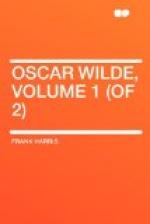“Then they knew you as a great talker even at Oxford?” I asked in some surprise.
“Frank,” he cried reprovingly, laughing at the same time delightfully, “I was a great talker at school. I did nothing at Trinity but talk, my reading was done at odd hours. I was the best talker ever seen in Oxford.”
“And did you find any teacher there like Mahaffy?” I asked, “any professor with a touch of the poet?”
He came to seriousness at once.
“There were two or three teachers, Frank,” he replied, “greater than Mahaffy; teachers of the world as well as of Oxford. There was Ruskin for instance, who appealed to me intensely—a wonderful man and a most wonderful writer. A sort of exquisite romantic flower; like a violet filling the whole air with the ineffable perfume of belief. Ruskin has always seemed to me the Plato of England—a Prophet of the Good and True and Beautiful, who saw as Plato saw that the three are one perfect flower. But it was his prose I loved, and not his piety. His sympathy with the poor bored me: the road he wanted us to build was tiresome. I could see nothing in poverty that appealed to me, nothing; I shrank away from it as from a degradation of the spirit; but his prose was lyrical and rose on broad wings into the blue. He was a great poet and teacher, Frank, and therefore of course a most preposterous professor; he bored you to death when he taught, but was an inspiration when he sang.
“Then there was Pater, Pater the classic, Pater the scholar, who had already written the greatest English prose: I think a page or two of the greatest prose in all literature. Pater meant everything to me. He taught me the highest form of art: the austerity of beauty. I came to my full growth with Pater. He was a sort of silent, sympathetic elder brother. Fortunately for me he could not talk at all; but he was an admirable listener, and I talked to him by the hour. I learned the instrument of speech with him, for I could see by his face when I had said anything extraordinary. He did not praise me but quickened me astonishingly, forced me always to do better than my best—an intense vivifying influence, the influence of Greek art at its supremest.”
“He was the Gamaliel then?” I questioned, “at whose feet you sat?”
“Oh, no, Frank,” he chided, “everyone sat at my feet even then. But Pater was a very great man. Dear Pater! I remember once talking to him when we were seated together on a bench under some trees in Oxford. I had been watching the students bathing in the river: the beautiful white figures all grace and ease and virile strength. I had been pointing out how Christianity had flowered into romance, and how the crude Hebraic materialism and all the later formalities of an established creed had fallen away from the tree of life and left us the exquisite ideals of the new paganism....
“The pale Christ had been outlived: his renunciations and his sympathies were mere weaknesses: we were moving to a synthesis of art where the enchanting perfume of romance should be wedded to the severe beauty of classic form. I really talked as if inspired, and when I paused, Pater—the stiff, quiet, silent Pater—suddenly slipped from his seat and knelt down by me and kissed my hand. I cried:




